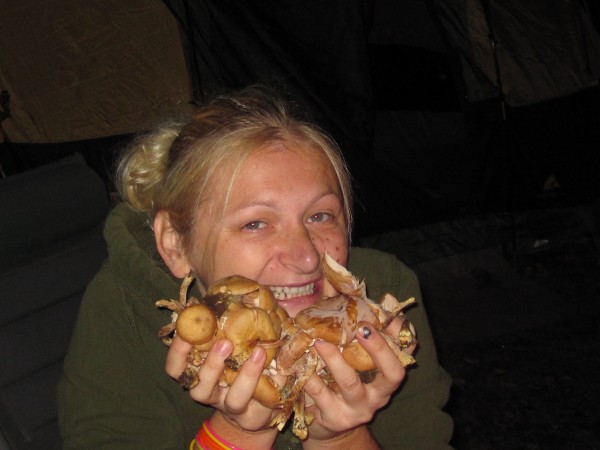
06 Aug 37th Annual Telluride Mushroom Festival 2017: Overview
The 37th annual Telluride Mushroom Festival takes place Thursday, August 17 – Sunday, August 20. The full schedule is here. Migrate around the site to find info on presenters, venues, book-signings etc. Or simply filter by topic or venue. Tickets/passes here.
Scroll down to the bottom of the story to check out the specials for locals, including a $25, 3-punch pass and the schedule for all the book-signings.
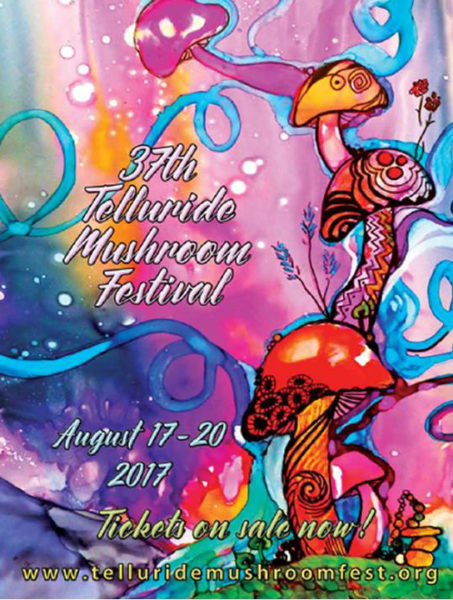
Overview/History:
One of the primary roles of fungi in the ecosystem is rehabilitation through decomposition, so there may be a really great way to “clean up the swamp” – on the Beltway that is.
How does myco-remediation sound?
As every year, there should be plenty of remediating going around at the 37th annual Telluride Mushroom Festival. In addition to learning how to use fungi to decontaminate, maintain and heal challenged spaces, however, there are also updates on the evolving science of mushrooms as medicine.
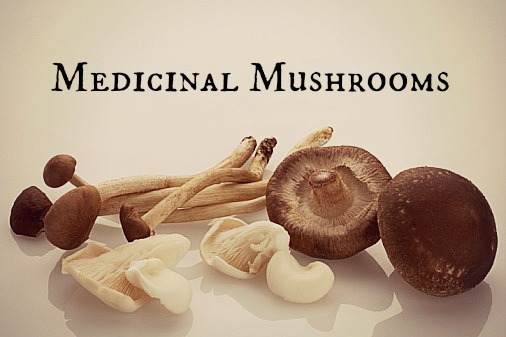
Research into the health benefits of the approximately 100 species of mushrooms being studied for such properties includes: immune system boost (by increasing the production of antiviral and other proteins released by cells while they are trying to protect and repair tissue); source of vitamin D and antioxidants; pump metabolism because mushrooms contain vitamin B, essential for converting food into fuel.
Penicillin, streptomycin and tetracycline all come from fungal extracts.
The potent anti-inflammatory characteristics of Cordyceps could prove helpful for mitigating the impact of asthma, stroke, arthritis. They also are shown to have antidepressant effects, aid in normalizing cholesterol levels, and more.
Some mushrooms, particularly Turkey Tail and Reishi, appear to contain an arsenal of cancer-busting compounds.
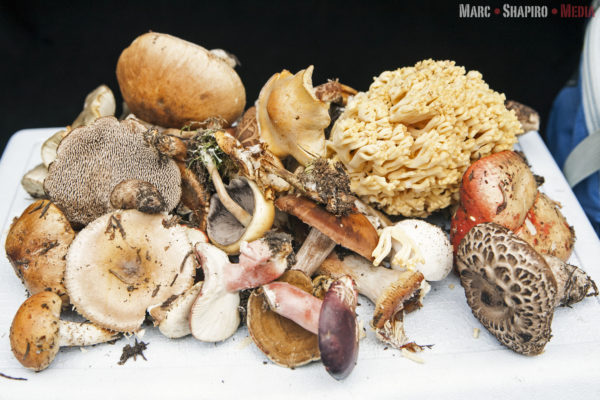
Festival attendees can also expect a series of talks based on this year’s theme, Defenders of Our Wild Habitats.
And, according to Festival director Britt Bunyard, the second main track focuses on psychedelic mushroom research, the subject of several presentations, plus a panel discussion.
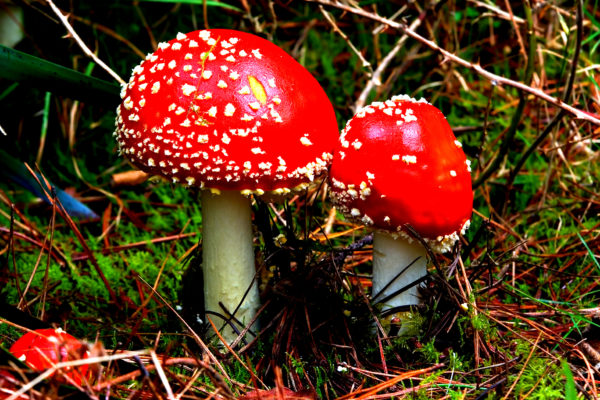
Daily edible mushroom forays are, of course, in the program, as are culinary events.
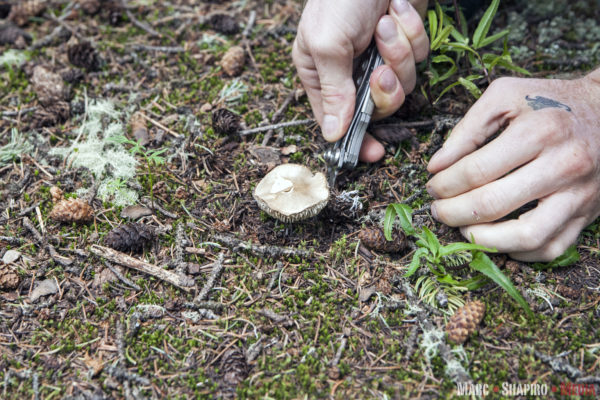
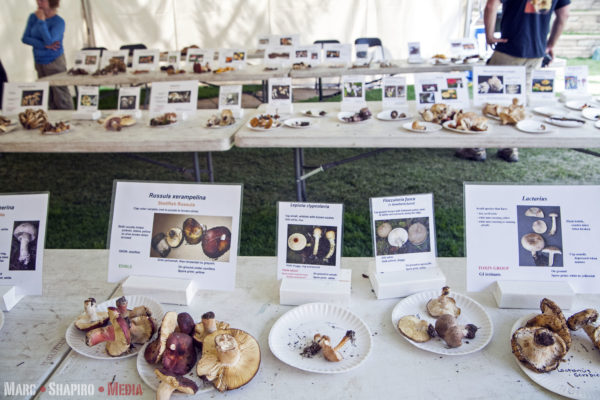
And while we are on the subject, for the record, wild mushrooms have always prompted wild debate because they make great eats – but also can kill you. In some parts of the world – Telluride is one such address – mushrooms are prized for their culinary properties and that is a good thing because, as described above, mushrooms contain some of the most potent natural medicines on the planet. Elsewhere on the map, not so much: mycophobes associate fungi with witches and serpents oh my.


The Telluride Mushroom Festival has a long and celebrated history as the largest wild mushroom event, fair or gathering in North America.
Since 1981, fungophiles of all sorts – from Andrew Weil to Thomas Szasz, from Rita Rosenberg to Lynn Margolis, from Sasha Shulgin to the late Terence McKenna — have come to our mining-camp-turned-resort-mecca to talk about identification, growing methods, medicinal uses, forest remediation, drug scapegoating, culinary recipes, biological theory, entheogenic practice, and the way of the psychonaut.


“Shroompa” Art Goodtimes. In the beginning there was…
Highlights/Speakers:
Don Lattin is an award-winning journalist and the author of six books. His most recent work, Changing Our Minds– Psychedelic Sacraments and the New Psychotherapy, was published in spring 2017.
![]()
His keynote on Thursday, 7:45 p.m., is about Rebranding Psilocybin: From Magic Mushrooms to Modern Medicine.
“Lots of great information here on the history of research and what’s going on right now,” says Bunyard.
Nicholas (Nik) P. Money is a British gentleman of letters and professor at Miami University in Oxford, Ohio. He is an expert on fungal growth and reproduction. Nicholas has authored a number of popular science books that celebrate the diversity of the microbial world, including Mr. Bloomfield’s Orchard (2002) and The Amoeba in the Room (2014).
Nik Money
Britt Bunyard: “Mostly Nik studies the mechanics of spore production and discharge, especially ballistospory. He uses an ultra high-speed camera to reveal the ‘fastest flights in nature.’ As great of a speaker as the man is, his talk is equaled by his writing: most of my favorite books on mycological topics were written by Nik Money, notably Mr Bloomfield’s Orchard and The Triumph of the Fungi. Nik has taken to mycological fiction now too and has a new book out. His second presentation will be based on that work.”
The keynote on Friday, 7:30 p.m., is all about The Meaning of Life in Ten Mushrooms.
Dennis McKeena’s research focuses on the interdisciplinary study of Amazonian ethnopharmacology and plant hallucinogens. He has conducted extensive ethnobotanical fieldwork in the Peruvian, Colombian and Brazilian Amazon. McKenna’s doctoral research examined the ethnopharmacology of ayahuasca and oo-koo-he, two tryptamine-based hallucinogens used by indigenous peoples in the Northwest Amazon.
McKeena is currently Assistant Professor in the Center for Spirituality and Healing at the University of Minnesota.
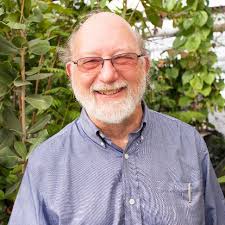
On Friday, 12:15 p.m.. Dennis McKenna talks about Psychedelics Rediscovered: New Uses for Ancient Medicines.
His keynote on Saturday, 7:30 p.m. talks about What a Long Strange Trip It’s Been: Reflections on the Ethnopharmacological Search for Psychoactive Drugs, 1967-2017.
“So much historical insight on pretty much all things psychedelic research. My butt will be in a front row seat,” notes Bunyard.
Peter Hendricks is a clinical psychologist with expertise in the treatment of addiction. A native of Washington DC, he currently lives in Birmingham, Alabama, where he is an Associate Professor in the School of Public Health at the University of Alabama at Birmingham.

“At the School of Public Health at the University of Alabama at Birmingham, Peter is conducting a pilot study of psilocybin-facilitated psychotherapy for cocaine dependence, the first such investigation of its kind.”
Hendricks’ talk on Friday, 1-:45 a.m. is about Awe as Antidote: Deconstructing the Psychological Underpinnings of Psilocybin-facilitated Psychotherapy.
Matthew W. Johnson, Ph.D., Associate Professor of Psychiatry at Johns Hopkins University School of Medicine, is one of the world’s leading experts on the effects of psilocybin and other psychedelics. For 20 years, Johnson has conducted academic research in psychopharmacology and addictions. He was lead author on safety guidelines for human psychedelic research, published in 2008, and which have facilitated the safe initiation of psychedelic research at an increasing number of universities.

Johnson’s talk on Friday, 9 a.m. covers the results of 13 years of psychedelic research at Johns Hopkins. It is entitled Psilocybin Effects on Mystical Experience, Personality Change, Meditation, Cancer-Related Distress and Addiction.
“Rad” Tradd Cotter is a cutting-edge microbiologist, professional mycologist, and organic gardener, who has been tissue culturing, collecting native fungi in the Southeast, and cultivating both commercially and experimentally for more than 22 years. In 1996, Cotter founded Mushroom Mountain, which he owns and operates with his wife Olga. There the couple explores applications for mushrooms in various industries and currently maintains over 200 species of fungi for food production, mycoremediation of environmental pollutants, and natural alternatives to chemical pesticides.
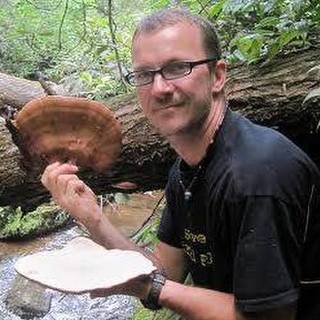
Cotter is speaking throughout the weekend, including a talk on Saturday, 11:30 a.m., about Culturing and Maintaining Entomopathogens as Mycopesticides.
Other key Mushroom Fest events:
The panel discussion with a tie-in to this year’s theme – Defending Fungal Biodiversity NOW! An International Effort, Saturday, 1 p.m. – features presenters who have worked on endangered mushrooms, endangered mushroom habitats, or peoples living in those endangered areas.
The panel includes Tradd Cotter, who has worked in Haiti; Elinoar Shavit, a world authority on endangered desert truffles and habitat; Larry Evans who works in the South American rainforests; Daniel Winkler, who works on Himalayan mushrooms; Jonathan Reisman, who labors in impoverished areas of Asia; and panel moderator Giuliana Furci, world-famous for her work in getting endangered mushrooms protected in Chile and elsewhere.

Giuliana Furci leads panel discussion on Festival theme.
“In any given month, Giuliana is in a different part of the world speaking to leaders of her government or beyond,” adds Bunyard.
Mushroom Fest is also showing two exciting movies, both ethnomycological: Little Saints is entheogenic and indigenous (Americas) peoples-based; Taming the Witch Baba Yaga has to do with ethnomycology in Eastern Europe and the legends surrounding the Baba Yaga.
“Baba Yaga is an acclaimed indie movie that’s won many awards,” says Bunyard.
Telluride Mushroom Festival offers forays with experts from the region and around the world, including Gary Lincoff author of the Audubon Guide and so much more.

#1 in his field, Gary Lincoff
Says Bunyard, “Recently Gary was awarded the Wasson Prize from the academic Mycological Society of America. That is their highest honor. Whenever asked to make a statement about Gary, I always note that he is THE greatest living American mycologist. No one alive is more knowledgeable about fungi than Gary Lincoff.”
For those wanting to get into the weeds a bit and cultivate mushrooms on their own, experts will teach participants everything from how to build a lab from the ground up, including how to make sterile chambers for culturing isolates of fungi to how to make all manner of growth media, including inoculation on homemade or prepared material, as well as materials readily sourced like straw.
Steve Shapson from Wisconsin – “you HAVE to know cheese if you’re from Wisconsin, right?,” quips Bunyard – leads a culinary event focusing on fermentation and cheese-making.

“Steve plans to showcase a number of different fungal fermentations: kombucha, kefir, etc., along with cheese-making. And there should be plenty to taste in the late afternoon,” adds Bunyard.
At the new SHOW Bar, Telluride Mushroom Festival guests can grab a glass of wine or beer to pair with other samplings.
“And we’re working on reviving the massive mushroom cookoffs that used to take place annually at the Festival in the park, with a chance for everyone to pitch in as well as bring their own mushrooms to cook up.”
Special for Locals:


More about Telluride Mushroom Festival director Britt Bunyard:

Britt Bunyard, publisher and editor-in-chief of FUNGI Magazine.
Britt Bunyard is publisher and editor-in-chief of FUNGI Magazine.
He has also worked as a full-time biology professor in Ohio and Wisconsin, teaching a broad range of undergraduate and graduate courses in evolution, microbiology, mycology, invertebrate zoology, biochemistry, and environmental science.
Additional scholarly achievements include publication of scientific papers in 16 different international research journals, one patent, and articles in popular science magazines.
Bunyard has served as Editor-in- Chief of NAMA’s journal McIlvainea and newsletter The Mycophile, and as a subject editor for the Entomological Society of America’s journal “Annals of the Entomological Society of America.”
Bunyard also gives several invited lectures in North America and abroad each year and regularly takes part in many mycological events and forays. He has been featured on NPR’s “All Things Considered” and has reviewed several published mushroom guide books.
Britt Bunyard has been a consultant for National Geographic Magazine and for an episode of PBS’s NOVA television program.
He is married and has three children and lives with his family in southern California.


Sorry, the comment form is closed at this time.